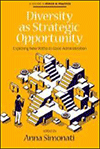
Diversity as Strategic Opportunity
Exploring New Paths to Good Administration
Edited by:
Anna Simonati, Università degli Studi di Trento
A volume in the series: Ethics in Practice. Editor(s): Robert A. Giacalone, Texas State University. Carole L. Jurkiewicz, University of Colorado, Colorado Springs.
Published 2024
The principle of equality has always been considered as one of the fundamental values of modern societies; it compels administration to provide equal treatment to all subjects it enters in touch with, which is normally expressed as a general prohibition of discrimination. However, in recent times, the idea, according to which equality is not based only on protection against discrimination but also on promotion of diversity as a source of richness for society, is widely shared. This book gives a multidisciplinary overview of some of the possible methods and tools which are nowadays experimented by administration, in order to properly face the practical problems connected to diversity.
ENDORSEMENTS:
"In this volume, Professor Anna Simonati has gathered a wide range of contributions which reflect on the nature of diversity, and its value in society today. Power structures are sticky. This volume reminds us that concepts as old as equality and equity, do not always manifest in ways that create diversity in these structures. The case studies within demonstrate that diversity will lead to empowerment - in other words, shifting the inherent power structures and opening opportunities for all. It is important for democracies to rebalance power structures, and deliberate administrative policies and practices aimed at diversity - as exemplified here - can make real differences for people. Critically, the volume also addresses diversity in education. Preparing the next generation for a world where diversity is a given, rather than a struggle is a worthy goal. This volume provides pathways for policy makers and those who deliver policy with a view to achieving this goal." — Adam Masters, The Australian National University
"The book makes a substantive contribution to our understanding and appreciation of how diversity can and ought to be seen not only as something to be protected by means of non-discrimination rules and mechanisms, but also and indeed primarily as a major source of development and improvement for public administration and the public services. Diversity is indeed a strategic opportunity, and this collective work developed under the leadership of Professor Anna Simonati shows us why and how to make the most of such strategic opportunities for public organizations worldwide." — Edoardo Ongaro, The Open University
"This Book is really precious because in its comparative approach, takes into account the legal provisions of many national Jurisdictions and the experience of many public Administrations all over the World. The Values of Diversity and Inclusion thus are considered non-only as general principles of Law, but in their action vis a vis the duty of Administrations to provide equal treatment to all subjects they enter in touch with. The aim of the Volume, as Anna Simonati explains, is not aimed at offering final and definite answers, nor a systemic study of the subject, but to address the various possible causes of discrimination and most importantly the possible remedies against it with a Case oriented Analysis. This collective work therefore it is extremely valuable to underline how the Public Policies and the Administrative Law tools can be fundamental -in many different ways- for the never ending struggle towards Equality and Justice." — Aristide Police, LUISS University
CONTENTS
-
Paperback979-8-88730-547-9
Web price: $45.04 (Reg. 52.99)
-
Hardcover979-8-88730-548-6
Web price: $80.74 (Reg. 94.99)
- eBook979-8-88730-549-3

- EDU001000 - EDUCATION: ADMINISTRATION: General
- EDU029010 - EDUCATION: TEACHING METHODS & MATERIALS: Mathematics
- EDU036000 - EDUCATION: Organizations & Institutions
-
 Educating in Ethics Across the Professions
A Compendium of Research, Theory, Practice, and an Agenda for the Future
Educating in Ethics Across the Professions
A Compendium of Research, Theory, Practice, and an Agenda for the Future
-
 Ethics and Crisis Management
Ethics and Crisis Management
-
 Ethics and Risk Management
Ethics and Risk Management
-
 Ethics Training in Action
An Examination of Issues, Techniques, and Development
Ethics Training in Action
An Examination of Issues, Techniques, and Development
-
 How to Transform Workplace Bullies into Allies
How to Transform Workplace Bullies into Allies
-
 Organizational Ethics and Stakeholder Well-Being in the Business Environment
Organizational Ethics and Stakeholder Well-Being in the Business Environment
-
 Radical Thoughts on Ethical Leadership
Radical Thoughts on Ethical Leadership

